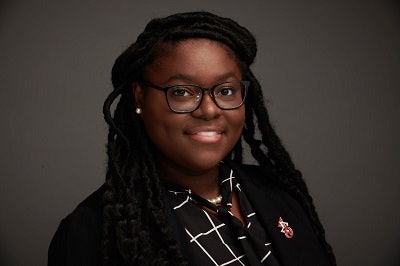COVID-19 has altered plans for aspiring lawyers to take the Law School Admission Test (LSAT), sit for bar exams and launch their careers. Yet, many have persevered and overcome the challenges brought on by the ongoing pandemic.
Brea Williams is a second-generation college student who graduated from the historically Black Alabama State University this past May and had planned to take a gap year pre-COVID.
“It was a blessing for me personally because I got downtime to actually organize and plan out what I wanted to do for myself,” Williams said. The gap year also allowed her some time to deal with grief following the loss of her father and best friend during her senior year.
“Law school is very intense,” Williams added. “You can’t halfway be there. You have to be 110%.”
 Brea Williams
Brea WilliamsWilliams is taking the LSAT in November and is paying $1,200 for a test prep course.
“Institutions [like Alabama State] aren’t prepped into generationally making sure there’s a [preparatory] class for law students because we’re just getting to a point where we have our first bachelor’s degree,” she said.
So she had to take matters into her own hands.
Even with the extra time to study, Williams said she is still worried about doing well on the LSAT-Flex, which is a condensed version of the traditional in-person LSAT exam. The LSAT-Flex has fewer questions than the LSAT and is administered virtually. Also challenging is the prospect of paying $45 to cancel a request to send scores to law schools should aspiring law students not get the score they had hoped for, Williams added.
“But if you asked me, it’s another systemic thing,” she said. However, it is not stopping her from continuing her studies and becoming the first person in her family to earn a law degree.
COVID-19 can also impact how aspiring lawyers finance their legal education.
At the 7th Annual National HBCU Pre-Law Summit and Law Expo, founded by attorney Evangeline Mitchell and sponsored in conjunction with the Law School Admission Council two weeks ago, Teria M. Thornton, manager for education and diversity initiatives at AccessLex, offered participants a reality check.
“Due to COVID-19, you may not be able to work at all,” she said. “Make sure to take care of those family obligations and financials before you apply to grad school — as it’s an expense.”
Still, COVID-19 has not impacted law school deferment, Thornton said. Applications for fall 2021 are actually higher than they were in the previous two years, she added.
While Aaron Abram, 29, a senior at Clayton State University in Morrow, Georgia, may not have family obligations, he still has financial obligations to fulfill, including paying rent. He is a full-time student, a full-time worker, a part-time server and he is still studying for the LSAT.
 Aaron Abram
Aaron AbramChanges brought on by the COVID-19 pandemic have allowed pre-law students like Abram to participate in regional and national job fairs and summits remotely. Such virtual events have allowed for a larger community outreach, said Rachel E. Barnes, the chair of the National Black Law Students Association (NBLSA).
In fact, at the National HBCU Pre-Law Summit and Law Expo, Abram and some individuals who networked online bonded over “how hard it is to stay focused, how hard it is to study, to commit time to preparing for LSAT and law school,” in part due to COVID-19’s impact on testing and living in uncertain times.
For him, being in a one-bedroom apartment while studying and even taking the LSAT-Flex is “disadvantageous,” he said. “I like to underline, highlight … and while you can do those things on the tablet, it just wastes a lot of time that you don’t really have.”
“I want to be in a testing environment. I want to be in a physiological mode of testing,” he added. Yet, he’s trying to stay positive and hopeful for the future.
Thorton said that “despite everything that is happening around us, applicants are really thinking about what they want to do with their future and are still pursuing the necessary steps needed to get admitted in law school.”
College students like Linda Akele, a sophomore political science major on a pre-law track at Saint Peter’s University, and Chris Escobar, a recent graduate of Washington University in St. Louis Law School, are also a testament to COVID-19 not impacting their decision to pursue a law degree.
“I would love to become a lawyer one day because the legal field needs more Black women,” said Akele.
In addition, she wants to change the criminal justice inequities Black and Brown men and women face. She hopes to attend Howard University next spring.
Escobar was originally going to take the bar exam in New York, but when New York changed the bar exam date, he pivoted to take the exam in Missouri — and passed.
He said that there is an urgent need for lawyers, particularly “in the health care space, and housing space — with a lot of people being put out of work, furloughed, and whatnot,” he said.
Escobar is one of the lucky ones. He plans to begin practicing law in January.
Law school is definitely a challenge, said Barnes, “so making sure that you’re in the mental headspace to go into your new job with the right energy, the right attitude, the right effort, is really important,” she said, adding that self-care is important during these stressful times. “I would encourage students to take some time for themselves.”



















